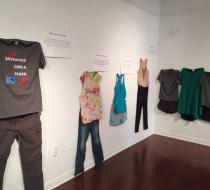"What were you wearing?" Survivor Art Installation 1 Favorite
It is an art installation that tells the story of 18 victims of sexual assault and what were they wearing at that time.
"What were you wearing?"
It's an accusatory and suggestive question that people often ask victims of sexual assault as if they would have been saved from misfortune if they had dressed less skimpy and sexy. It seems that most people miss the point - it's not the clothes that cause sexual assault, it's the person who causes it!
"I missed a couple of days of work after it happened. When I told my boss, she asked me this question. I said, 'A t-shirt and jeans bitch, what do you wear to a basketball game?' I walked out and never came back." This is one of the 18 victims that suffered sexual assault.
Too often, 'rape culture' emphasizes not how to stop rape but how to prevent being raped, and it leads people to believe that what the victim wears matters. The attacker is often ignored, while the victim is the target of criticism and suspicion.
We need to recognize that when someone has the misfortune to experience something like this, the only useful question we can ask the victim is "What can I do to help you?" Rather than asking irrelevant questions about what they were wearing in the event of an accident.
That's What 'What were you wearing? 'The message you want to send to the public.
It hopes to eliminate the victims' sense of shame and self-accusation after being accused of misfortune and hopes that victims can face up to their hearts and recover as soon as possible after being accused of misfortune, rather than blindly being accused of verbal violence, so as to feel shame and fear.
Sexual assault has caused great harm to a person, but the silence, remorse, shame, and even abuse of the victim after a sexual assault are more terrible than the sexual assault itself.







